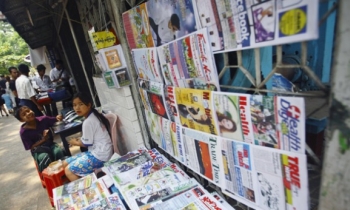Armed policemen and intelligence personnel besieged the offices of Monitor Publications Ltd in Ugandan capital Kampala on Thursday night marking the culmination of a weeklong witch hunt of independent Daily Monitor newspaper. The raid is beng seen as President Yoweri Museveni's efforts to neutralise support for imprisoned opposition leader Kizza Besigye.

"A night-time police raid on a newspaper and interception of its delivery trucks are despotic reflexes which the Ugandan government should abandon for good," press freedom organisation Reporters sans Frontières (RSF) said. "The Daily Monitor has often been targetted by the president and his ministers and it is now time to leave it in peace. Attacking the independent press during times of political unrest just makes things worse."
Around 20 armed policemen raided the building housing the Daily Monitor and Radio 93.3 KFM in the Namuwongo industrial district of Kampala shortly after 11 pm on Thursday, wanting to know who was responsible for posters that had been put up in various parts of the city by the main opposition party, the Forum for Democratic Change (FDC). The posters appealed for donations to an organisation for the defence of political prisoners named after the FDC's leader, Besigye, who was arrested on charges of treason and rape when he recently returned from exile.
The police thought the newspaper's staff should know who was responsible since they ran an identical half-page advertisement in their latest issue. Without explaining why, the policemen claimed that the newspaper needed police permission to publish such an announcement and that it had therefore broken the law. The newspaper's staff disputed this, and the police finally withdrew at around 1 am.
Shortly thereafter, the newspaper's delivery trucks were stopped and inspected by police in various parts of the country, especially the west and the north, on the road to Entebbe international airport and in Besigye's stronghold, the southwestern town of Rukungiri. The police also sealed off the newspaper's local offices in Rukungiri and Kabale in order to seize copies as they were delivered. In the eastern town of Pallisa, police ordered a Daily Monitor representative not to distribute the newspaper. Distribution finally resumed after the newspaper's management intervened.
The Daily Monitor was threatened with closure on November 15 after it carried a report claiming that President Yoweri Museveni originally chose his half-brother, Salim Saleh, as head of the armed forces before changing his mind. The newspaper had to publish a government denial to avoid "other measures" by the authorities. In October 2002, the Monitor has been closed down by the government for publishing a story that said an army helicopter had come down in a rebel territory in northern Uganda.

The article's author, star political journalist Andrew Mwenda, was arrested on August 12 and released on bail three days later because of comments he made in a programme he presents on Radio 93.3 KFM about the death of Sudan's former rebel leader John Garang in a helicopter crash. He still faces a possible five-year prison sentence on charges of sedition.
On November 1, Mwenda pleaded not guilty to a further 13 charges of sedition and "promoting sectarianism" in connection with the same talk show, according to local and international news reports. The magistrate postponed the case until the constitutional court rules on a petition filed by Mwenda. The journalist is challenging Uganda's sedition law on the grounds that it violates constitutional provisions on freedom of expression and freedom of the press.
Conrad Nkutu, managing director of The Monitor, told New York-based Committee to Protect Journalists (CPJ) that information minister James Nsaba Buturo had written to The Monitor on Sunday last demanding a retraction and apology otherwise the government would take "other measures." The Monitor published the government statement in full the following day, but the authorities did not appear to be satisfied, Nkutu said. He said the paper stood by its story.









